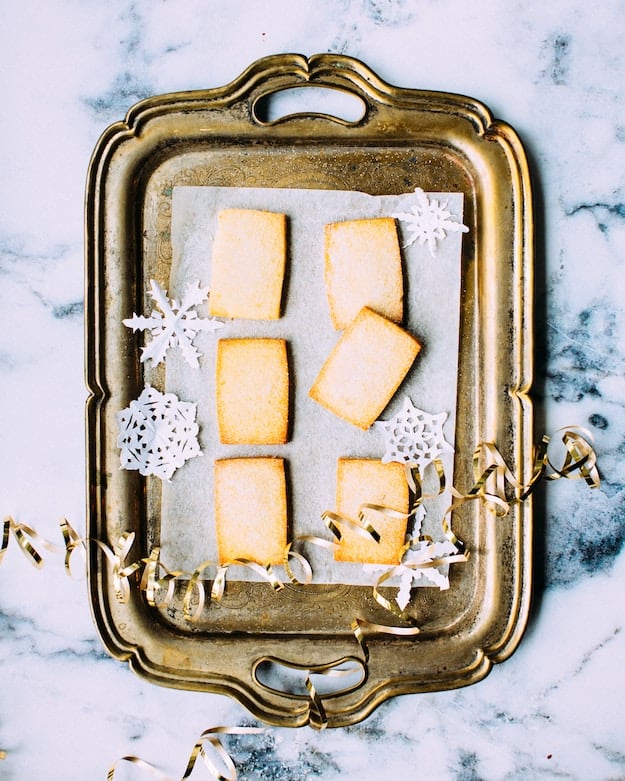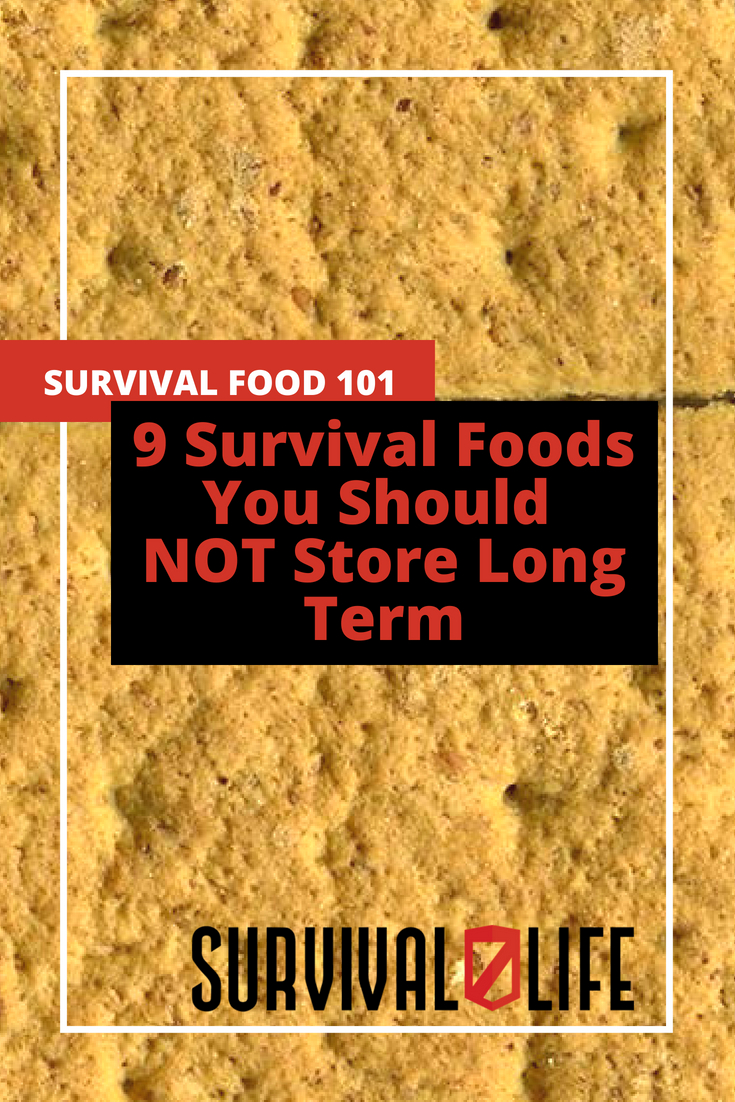Featured Articles
9 Survival Foods You Should NOT Store Long Term

Since 2009, Lisa at The Survival Mom has been one of the most read and respected voices in the prepping community. We are excited to be sharing some of her most popular articles right here on Survival Life. Check back every Monday for her latest article so you never miss any of Lisa’s expert knowledge!

STOP! Before throwing any of these items away, read this post about repackaging food!!
Based on my own personal experiences and mistakes, I do not recommend storing these foods in large quantities, long-term. Let me know what you think of my list and what other foods you would add.
I discuss this list in this episode of The Survival Mom Radio Show.
Foods to not store, long-term
1. Any canned vegetable or fruit that you do not like
Don’t assume you will fall in love with slimy, aged canned apricots five years from now if you detest apricots now! Canned veggies and fruits aren’t nearly as tasty as fresh versions, so if you decide to store them, make sure you really like them.
2. Tuna
I know that canned tuna is a staple in many food pantries. However, I’ve discovered that after a couple of years, canned tuna becomes mushy. Now, if you love the taste of tuna, you may not mind the mushy version, but for me, I really didn’t like it. Also, tuna from various parts of the world has been known to contain mercury and other contaminants.
3. Flour
As flour ages, it can develop a stale, rancid smell. Additionally, it likely contains the microscopic eggs of flour weevils, which will hatch at some point. To get the longest possible shelf life out of flour, first place it in an airtight container and freeze it for about a week. This will kill the insect eggs. Then, before storing it, add an oxygen absorber or two, depending on the size of the container. Still, you can expect a shelf life of 18 months or so from flour, which is why most preppers prefer to store wheat.
4. Saltine crackers

Just for fun, take a sleeve of saltine crackers out of the box and set them aside, at room temperature, for 3 or 4 months. You’ll never get over the stench of rancid saltines! If you must, you could store them in an airtight container with oxygen absorbers, or learn how to make them from scratch. Buy and enjoy saltines but do rotate through them and don’t depend on a giant stash staying fresh a year from now.
5. Graham crackers
I didn’t think our family favorite, graham crackers, could go bad, but they do go rancid with time. Again, you can repackage them in an airtight container using oxygen absorbers, but that’s a lot of extra work. You can also store the ingredients to make homemade graham crackers. Have an extra 3 or 4 boxes around is quite fine. Just remember to rotate and use up the oldest crackers first, while storing the newly purchased crackers for later.
6. Breakfast cereals
These are not packaged for long term storage, likely contain GMO ingredients, and probably contain a lot of additives that you would just as soon not consume. However, I know they’re a quick and handy breakfast food, especially if you have kids. If you must store them, again, rotate and repackage them for the longest possible shelf life.
You’ll love these delicious dehydrated survival foods. https://t.co/FU2Rp6v0r4 pic.twitter.com/sQGogix5WG
— Survival Life (@SurvivalLF) August 16, 2016
7. Canned tomato products
Personally, I have always stored a number of canned tomatoes, tomato sauce, and tomato paste, but then, we use those products often in our meals. Over the years I have heard more complaints about canned tomatoes than any other canned foods: the cans leak, they bulge, a seam opens. If you store these, be sure to rotate through them and plan on growing your own fresh tomatoes so you’ll have those to rely on instead. 8. Home-dehydrated foods Again, these aren’t bad, but for long-term storage they won’t last nearly as long, mold-free, as commercially dehydrated foods. This is because we have no way of measuring the actual moisture content of our home-dehydrated foods. We dry them, “until crispy” or “leathery” but those are pretty subjective measurements. Commercially dried foods are tested for moisture and then packaged in a container in which most or all of the oxygen has been removed. If you dehydrate your own foods, and please continue to do so!, just keep in mind that it has a shelf life of a year, maybe two, and rotate through them.
Learn how to repackage your favorite survival foods to make them last longer. https://t.co/QqYyPUNGBo pic.twitter.com/ssP4EfBBk2 — Survival Life (@SurvivalLF) August 16, 2016
8. Brown sugar
There really is no need to store brown sugar if you have granulated sugar and molasses on hand. Molasses has an extremely long shelf life, as does sugar, and when you combine 1 cup of sugar with 1 tablespoon molasses, you have freshly made brown sugar.
9. Bottled salad dressing
When a bottle of Kraft ranch salad dressing is the same color as Thousand Island, you know something went very, very wrong on your pantry shelf! That was our experience just last week. About 4 years ago I used a number of coupons to buy bottled salad dressings for my brand new food storage pantry. I didn’t stop to think that I usually make my own homemade dressings, so here these 8 or 10 bottles sat. Needless to say, we tossed them into the trash. It’s too easy to make homemade from fresh or shelf-stable ingredients, so forget the store-bought dressings unless you rotate through them fairly quickly.
Please keep in mind that I’m not saying to never buy these or never have a few of these on your shelf. They just aren’t good candidates for long term storage, so don’t stock up on them in large quantities unless you really are going to rotate through them on a regular basis.

What foods would you add to this list? Did we forget anything? Let us know in the comments!
-

 Do It Yourself7 months ago
Do It Yourself7 months agoParacord Projects | 36 Cool Paracord Ideas For Your Paracord Survival Projects
-

 Do It Yourself9 months ago
Do It Yourself9 months agoHow To Make Paracord Survival Bracelets | DIY Survival Prepping
-

 Do It Yourself9 months ago
Do It Yourself9 months ago21 Home Remedies For Toothache Pain Relief
-

 Do It Yourself10 months ago
Do It Yourself10 months agoSurvival DIY: How To Melt Aluminum Cans For Casting
-

 Exports8 months ago
Exports8 months agoAre Switchblades Legal? Knife Laws By State


Pingback: What's The Deal With GMOs? | Survival Life
Pingback: Dehydrated Foods to Try This Weekend | Survival Life | Blog
Pingback: Make Your Own Survival Food: Chocolate Chia Cookies | Survival Life
Pingback: Make Your Own Survival Food: Chocolate Chia Cookies | Savvy About Survival
Pingback: Survival Meal: Beef, Carrot & Potato Bundles | Survival Life
Pingback: 8 Survival Foods That Will Save You in A Power Outage | Savvy About Survival
Pingback: 8 Survival Foods That Will Save You in A Power Outage | Survival Life
Pingback: 8 Survival Foods That Will Save You in A Power Outage « Survivalist
Pingback: Essential Survival Fuel: No-Cook Overnight Oats | Survival Life
Pingback: Outdoor Survival Meal: Potato & Veggie Foil Packets | Survival Life